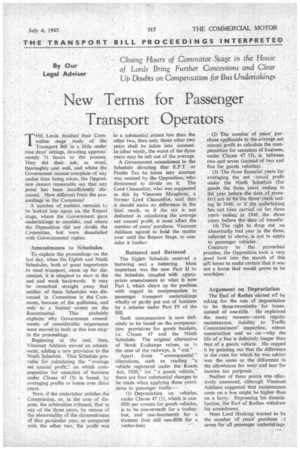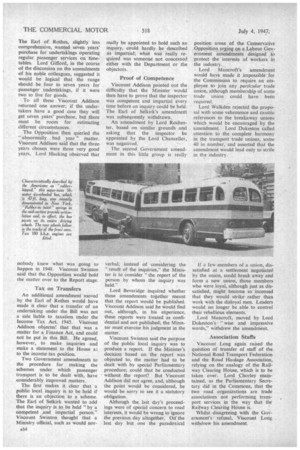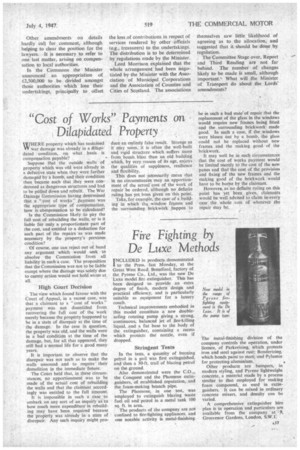New Terms for Passenger Transport Operators
Page 43

Page 44

Page 47

If you've noticed an error in this article please click here to report it so we can fix it.
By Our Legal Adviser THE Lords finished their Cornmittee stage study of the Transport Bill in a little under nine days' sittings, devoting approximately 51 hours to the process. They did their job, as usual, thoroughly and well, and whilst the Government cannot complain of any undue time being taken, the Opposition cannot reasonably .say that any point has been insufficiently discussed. How different from the proceedings in the Commons!
A number of matters remains t..) be looked into again on the Report stage, where the Government gave undertakings to consider, and where the Opposition did not divide the Committee, but were dissatisfied with Gcivernmental replies.
Amendments to Schedules To explain the proceedings on the last day, when the Eighth and Ninth Schedules, both of great importance to road transport, came up for discussion, it is simplest to start at the end and work backwards. It may be remarked straight away that neither of these Schedules was discussed in Committee in the Commons, because of the guillotine, and only to a limited extent on the Recommittal. This probably explains why Government amendments of considerable importance were moved to both at this late star in the proceedings.
Beginning at the end, then, Viscount Addison moved an amendment, adding a new provision to the Ninth Schedule. That Schedule provides for calculating the "average net annual profit,': on which compensation for cessation of business under Clause 47 (3) is based, by averaging profits or losses over three years.
Now, if the undertaker satisfies the Commission, or, in the case of dispute, the arbitration tribunal, that in any of the three years, by reason of the 'abnormality of the circumstances of that particular year, as compared with the other ti,vo, the profit was to a substantial extent less than the other two, then only those other two years shall be taken into account. In other words, the worst of the three years may be left out of the average.
A Government amendment to the Schedule directing that E.P T. or Profits Tax be taken into account was resisted by the Opposition, who threatened to divide on it. The Lord Chancellor, who was supported in this by Viscount Maugham, a former Lord Chancellor, said that it should make no ,difference in the final result, as if the tax is not deducted in calculating the average net annual profit, it must affect the number of years' purchase. Viscount Addison agreed to hokl the matter over until the Report Stage, to consider it further Battered and Bettered The Eighth Schedule received a battering and a bettering. Most important was the new Part II to the Schedule, coupled with appropriate amendments to what is now Part I, which clears up the position with regard to compensation to passenger transport undertakings wholly or partly put out of business • by a scheme under Part IV of the Bill.
Such compensation is now definitely to be based on the compensation provisions for goods hauliers, i.e. Clause 47 and the Ninth Schedule. The original alternative of Stock Exchange values, as i-i the case of the railways, is "out."
Apart from "consequential" alterations, such as reading "a vehicle registered under the Roads Act, 1920," for "a goods vehicle," there are four substantial changes to be made when applying these provisions to passenger traffic:— • (1) Depreciation on vehicles, under Clause 47 (1), which is onefifth per annum for goods vehicles, is to be one-seventh for a trolleybus, and one-fourteenth for a tramcar (but still one-fifth for a motor-bus). (2) The number of years purchase applicable to the aVerage net annual profit to calculate the compensation for cessation of business, under Clause 47 (3), is between two and seven (instead of two and five for goods vehicles). '
(3) The three financial years for averaging the net p.rinual profit under the Ninth Schedule (for goods the three years ending in the year before the date, of transfer) are to be the three ye,aii ending in 1948, or if the undertaking has not been carried on for three years ending in 1948, the three years before the date of transfer (4) The right to drop out an abnormally bad year in the three, referred to above, is not to apply to passenger vehicles.
Contrary to the proverbial practice, the Opposition took a very good look into the mouth of. this gift horse to make certain that it was not a horse that would prove to be worthless.
Argument on Depreciation The Earl of Rothes started of by asking for the rate of depreciation to be three-twentieths for buses, instead of one-fifth. He explained the many reasons—more regular maintenance, liability to Traffic Commissioners' inspection, robust construction and so on—why the life of a bus is definitely longer than that of a goods vehicle. He capped it by pointing out that the difference in the rates for which he was asking was the same as the difference in the allowances for wear and tear for income tax purposes.
Neither of these points was effectively answered, although Viscount Addison suggested that maintenance costs on a bus might be higher than on a lorry. Expressing his dissatisfaction, the Earl of Rothes withdrew his amendment.
Next Lord Hacking wanted to fix the number of years' purchase r.t seven for all passenger undertakings The Earl of Rothes, slightly less comprehensive, wanted seven years' purchase for undertakings operating regular passenger services on timetables. Lord Gifford, in the course of the discussion on the amendments of his noble colleagues, suggested it would be logical that the range should be four to seven years for passehger undertakings, if it were two to five for goods.
To all these Viscount Addison returned one answer; if the undertakers have a good case they will get seven years' purchase, but there must be room for estimating different circumstances.
The Opposition then queried the "abnormally bad year" matter. Viscount Addison said that the three years chosen were three very good years. Lord Hacking observed that nobody knew what was going to happen in 1948. Viscount Swinton said that the Opposition would hold the matter over to the Report stage.
Tax on Transfers
An additional amendment moved by the Earl of Rothes would have made it clear that a transfer of an undertaking under the Bill was not a sale liable to taxation under the Income Tax Act, 1945. Viscount Addison objectee that that was a matter for a Finance Act, and could not be put in this Bill. He agreed, however, to make inquiries and make a statement to the House as to the income tax position.
Two Government amendments to the procedure for making the schemes under which passenger transport is to be dealt with, have considerably improved matters.
The first makes it clear that a public local inquiry is to be held if there is an objection to a scheme. The Earl of Selkirk wanted to add that the inquiry is to be held "by a competent and impartial person." Viscount Swinton thought that a Ministry official, such as would nor
mally be appointed to hold such an inquiry, could hardly be described as impartial; what was really required was someone not concerned either with the Department or the objectors.
'Proof of Competence Viscount Addison pointed out the difficulty that the Minister would then have to prove that the inspector was competent and impartial every time before an inquiry could be held The Earl of Selkirk's amendment was subsequently withdrawn.
An amendment by Lord Rochester, based on similar grounds and asking that the inspector be appointed by the Lord Chancellor, was negatived.
The second Government amendment in this little group is really verbal; instead of considering the " result of the inquiries," the Minis.. ter is to consider "the report of the person by whom the inquiry was held."
Lord Beveridge inquired whether these amendments together meant that the report would be published. Viscount Addison said he would find out, although, in his experience, these reports were treated as confidential and not published; the Minister must exercise his judgment in the matter.
Viscount Swinton said the purpose • of the public local inquiry was to produce a report. If the Minister's decision based on the report was objected to, the matter had to be dealt with by special Parliamentary procedure; could that be conducted without the report? But Viscount Addison did not agree, and, although the point would be considered, he would be sorry to see it a statutory obligation.
Although the last day's proceedings were of special concern to road interests, it would be wrong to ignore the previous day altogether. On' the last day but one the paradoxical position arose of the Conservative Opposition urging on a Labour Government amendinents designed to protect the interests of workers in the industry.
Lord Mancroft's amendment would have made it impossible for the Commission to require an employee to join any particular trade union, although membership of some trade union could have been required.
Lord Walkden rejected the proposal with some vehemence and caustic references to the breakaway unions which would be encouraged by the amendment. Lord Dukeston called attention to the complete harmony in the transport trade unions, some 40 in number, and asserted that the amendment would lead only to strife in the industry.
If a few members of a union, dissatisfied at a settlement negotiated by the union, could break away and form a new union, those members who were loyal, although just as dissatisfied, might become so incensed that they would strike rather than work with the disloyal men. Leaders would no longer be able to control their rebellious elements.
,Lord Mancroft, moved by Lord Dukeston's "wise and impressive words," withdrew the amendment.
Association Staffs Viscount Long again raised the question of transfer of staff of the National Road Transport Federation and the Road Haulage Association, relying on the analogy of the Railway Clearing House, which is to be taken over. Lord .chorley maintained, as the Parliamentary Secretary did in the Commons, that the two road organizations are trade associations not performing transport services in the way that the Railway Clearing House is.
Whilst disagreeing with the Government's refusal, Viscount Long withdrew his amendment. Other amendments on details hardly call for comment, although helping to clear the position for the lawyers. It is necessary to refer to one last matter, arising on compensation to local authorities.
In the Commons the Minister announced an appropriation of f2,500,000 to be divided amongst those authorities which hose their undertakings, principally to offset the loss of contributions in respect of services rendered by other officials (e.g., treasurers) to the undertakings. The distribution is to be determined by regulations made by the Minister, Lord Morrison explained that the whole arrangement had been negotiated by the Minister with the Association of Municipal Corporations and the Association of Counties and Cities of Scotland. The associations themselves saw little likelihood of agreeing as to the allocation, and suggested that it, should be done by regulation.
The Committee Stage over, Report and Third Reading are not far behind. The number of changes likely to be made is small, although important:. What will the Minister of Transport do about the Lords' amendments?












































































